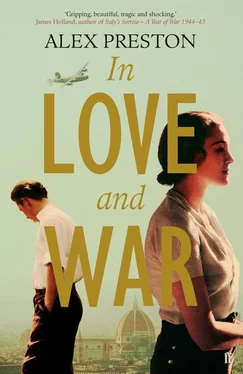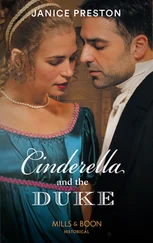He walked back along the Arno with his bag over his shoulder, keeping out of the way whenever he saw a cart or bicycle. At Pontedera he bought a ticket for Lucca, but instead boarded for Florence, getting out a stop early at Ginestra Fiorentina. It was dark by the time he reached the Oltrarno.
He waited in the tree-cover of the Villa Ventaglio until past eleven, watching the light in Ada’s apartment, her hair, her shadow on the ceiling. Sure that no one was watching, he crossed to ring at the door. She’d taken a while to come down, asked Chi è? through the letterbox.
His voice was heavy, choked. ‘I couldn’t go,’ he said, and the door opened, and there she was.
Esmond had suggested they move to the villa. There was already talk of the MVSN requisitioning Jewish property, and the apartment was simply too small to hide him for long. Carità’s smile at the railway station came to mind. He knew that, if word of his escape reached the Blackshirts, they’d be after his blood. One evening in October, over dinner with the Professor, he mentioned the unoccupied villa that sat on a hilltop to the south, the key to the front door given to Bailey before the Keppels left, now in a drawer in the sacristy. The Professor had nodded.
‘It may be the answer to a few other problems we’ve been having,’ he said. ‘We need a base out of the city, where people might— disappear.’
Later that night, Bruno Fanciullacci pulled up outside the apartment in a battered and spluttering Bianchi. He’d secured himself a job on the Fiat factory floor in Novoli by day; by night he organised hushed meetings, arranged messages to and from the numerous Communist Party leaders in gaol in Florence. He had shaved and showered since Esmond had seen him in Ada’s apartment. His moustache was a slick black line beneath which, ever twirling, the matchstick. He was wearing a new beige suit, a thin navy tie. He looked dashing and capable and Esmond felt a twist of jealousy. Ada sat in front beside Bruno with Tatters on her lap, Esmond in the back. They drove through the deserted town, lights off. The car jerked and squealed around corners, struggled up the smallest incline.
Every plume of mist from the river was a Fascist spy, every shadow hid a Blackshirt with a Beretta. They parked in one of the side streets in front of the Pitti Palace. Ada kept watch outside while Esmond and Bruno went into the church. It was dark inside, cool despite the warm night. Esmond picked up the key to the villa and, under a pile of surplices, Bailey’s Army standard W/T radio. Then, just as they were about to leave, he stopped.
‘ Aspetta ,’ he said, and Bruno shone his torch down the aisle. It found the triptych, which brought Esmond up short. ‘D’you think we’ll be bombed?’ he asked Bruno. ‘In Florence, I mean.’
‘Maybe. Depends how bad things get. How long it all goes on. They talk about an Open City, but—’
‘I want to take the paintings. Keep them with me up at the villa. If they’re evacuating art from the Uffizi, the Bargello, all the other churches, we should take care of these.’
Bruno looked at the triptych with a little shake of his head. ‘They won’t fit in the car.’
‘You go ahead, I’ll carry them up.’
Bruno shrugged, then smiled, moving the matchstick from one side of his mouth to the other. ‘We’ll see you up there — if the car makes it. Don’t get caught.’
With the paintings balanced on his head — not heavy, but catching every breeze — he set out up the via Romana. The moonlight was broken by clouds, but he kept to the shadows, relieved when he left the main road and began the long climb towards the villa. He heard the sputtering of the Bianchi’s engine somewhere ahead.
Bruno and Ada were waiting when he arrived at L’Ombrellino. He carried the paintings up into the house and arranged them by the table in the hall. Bruno had found a bottle of champagne, some glasses in the kitchen. Ada lit the candelabra in the entrance. They stood beside the paintings in the candlelight and toasted the new home. Tatters was already exploring, his footsteps clicking, halting as he caught a new scent, then darting into the upper parts of the house. They were silent in the hallway, listening to the dog’s progress. As he left, Bruno embraced them both, the matchstick prodding Esmond’s cheek.
‘Be careful, you two,’ Bruno said. ‘It’s a risk to love someone these days. They’ll use it against you, if they get you.’ Esmond drew himself up when Bruno left, the quicker to fill his space. They stood there, in the hall, watching the flames on the gilt of the paintings. Tatters clacked back in with a mouse clamped softly between his jaws. It was still alive, squirming gently. Esmond reached down and eased open the dog’s mouth. The mouse dropped, paused for a moment, overcome briefly by this unexpected redemption, then scurried off into the skirting-board.
They have been here at the villa for a year now. They have grown used to the strictures of their new life as eyes grow accustomed to darkness, though Esmond is dreading winter. He can scarcely believe they survived January ’42, when snow packed so thickly on the roof they’d heard it groaning like a whale in the night. Ice had patterned the windows, the pool had frozen over and the Arno, flowing heavy with snow-water, was just a black slash across the city below them. He’d had to drop rocks down the well in the garden before he could lower the bucket for water. During the day they’d huddled under eiderdowns bundled in clothes, Tatters a furry, breathy hot-water bottle between them. Later they lit fires in the kitchen, hoping no one would see the smoke. They barely slept, tucked into the hot fug, feeding vine-wood into the stove, gradually removing clothes and then bathing in a copper tub. They’d pour jugs of near-scalding water over each other, letting out animal bellows and gurgles of pleasure, then sit wrapped in their towels while potatoes baked in the oven, a bowl of carrots boiled on the stove. They read to each other: Ada Gerusalemme Liberata, Leopardi’s Zibaldone , Svevo’s Confessions of Zeno; Esmond Eugene Onegin, Mrs Dalloway, The Way We Live Now. They began to speak Italian as much as English, Ada correcting him on his grammar and pronunciation; now he dreams in both languages.
Once a week — Wednesday afternoons — Bruno would arrive at the wall at the end of the garden with a chicken or a stick of salami or a haunch of ham. He had Communist contacts in the north who could bypass both the government rationing teams and the black marketers, while relatives of Maria Luigia on a pig farm out towards Pistoia happily provided Bruno with supplies. He spoke breathlessly to Esmond of his efforts to unite the various liberalsocialista factions and their obdurate Communist cohorts. He was always fizzing with news, the matchstick dancing under his moustache as he talked, his hands sweeping across Florence as he described how they’d hound the Fascists into the Arno, throw them bodily from the Ponte Santa Trinità, and then build a country on the teachings of Gramsci, how Esmond and Ada’s children would grow up in a socialist paradise. At this last, Ada would blush and shove him in the chest. As he left, he’d hand them scribbled messages to transmit over the W/T set. They were always in code and made no sense to Esmond, although he began to recognise certain names — Penna, Rossino, Babbo.
Sometimes the Professor came in Bruno’s stead, climbing over the wall at the bottom of the garden and rapping on the window of the drawing room until they let him in. He’d brush the snow from his jacket and peer at them: avuncular, anxious. They’d serve him tea, extinguishing the fire as soon as the water boiled. He’d bring news that wasn’t on the radio: about the partisans high in the hills waiting for their moment to pounce, strikes at the factories in Milan, about the growing strength of the unions in the big cities and discontent among contadini in the south.
Читать дальше












